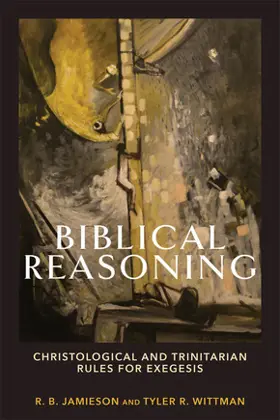

Biblical Reasoning Christological and Trinitarian Rules for Exegesis
Pages
320
Publisher
Baker Academic
Published
6/14/2022
ISBN-13
9781540964670
Biblical Reasoning shows how Christology and the doctrine of the Trinity are grounded in Scripture and how knowledge of these topics is critical for exegesis. It focuses on the continuity of Scripture's judgments with later doctrinal formulations, promoting a mutually informative relation between exegesis and theology born from attention to Scripture's primary acting subject: God revealed in Christ.
The authors explain that evangelical theology still maintains too sharp a divide between reading Scripture and formulating doctrine. A necessary means for overcoming this divide is attending to the grammar of Scripture's speech about Christ and the Trinity. Biblical Reasoning outlines key theological principles and rules for the exegesis of Christian Scripture. The authors explore how the triune God revealed in Christ shapes Scripture and its readers and how doctrinal rules intrinsic to Scripture help guide exegesis. The goal of biblical reasoning is the goal of Scripture itself: to shape readers into disciples who pursue the vision of the triune God in Christ.
Biblical Reasoning helps readers understand that theology should be more exegetical than many theologians think, and that exegesis should be more theological than many exegetes allow. It enables students to integrate what they learn in their biblical studies and systematic theology classes, making it an ideal textbook for hermeneutics and interpretation courses.
Part 2: Christological and Trinitarian Rules for Exegesis
Conclusion: From Glory to Glory
Appendix: Table of Principles and Rules
Indexes
- Contents
- Introduction: Theology for Better Exegesis
- Part 1: Biblical Reasoning
- 1. Seek His Face Always: The End of Biblical Reasoning
- 2. The School of Christ: The Pedagogical Context of Biblical Reasoning
- 3. The Curriculum of Christ: The Source and Practice of Biblical Reasoning
- 4. Worthy Are You: Understanding Scripture as Honoring God
- 5. The Lord Is One: The Trinity's Unity and Equality in Scripture's Twofold Discourse
- 6. Varieties of Activities but the Same God: The Trinity's Inseparable Operations and Scripture's Appropriation
- 7. One and the Same: The Unity of Christ and Scripture's Communication of Idioms
- 8. Greater Than Himself and Less Than Himself: Christ's Two Natures and Scripture's Partitive Discourse
- 9. God from God: From Missions to Processions
- 10. Putting the Rule-Kit to Work: Reading John 5:17-30